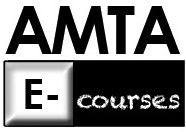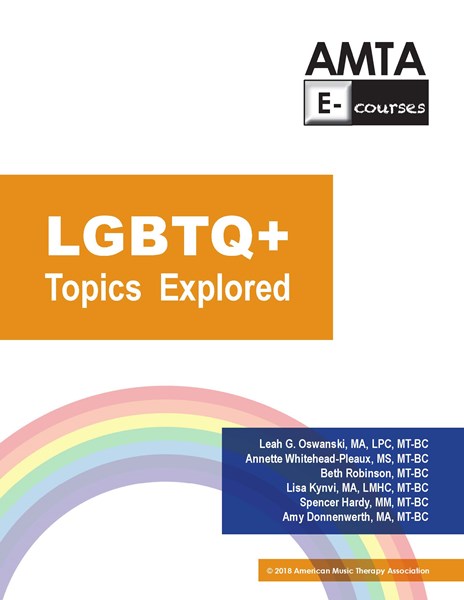Announcing New AMTA E-course
August 23, 2018 02:46 PM

New AMTA E-course Available:
LGBTQ Topics Explored

Presented by Leah Oswanski, MA, LPC, MT-BC; Annette Whitehead-Pleaux, MA, MT-BC; Lisa Kynvi, MA, LMHC, MT-BC; Beth Robinson, MT-BC; Spencer Hardy, MM, MT-BC; Amy Donnenwerth, MA, MT-BC
Current AMTA Members Receive Substantial Discounts on the Introductory Price:
- Regular Cost: $150 - includes 5 CMTE credits
- Current Members Discounted Cost: $100 - includes 5 CMTE credits
This AMTA E-Course covers several topics including terms and definitions, an overview of the 2012 study: Music therapists’ attitudes and actions regarding the LGBTQ community: A preliminary report, information about intersectionality and straight privilege, information on gender and transgender issues, LGBTQ history, LGBTQ musicians, ethics and LGBTQ ally development, and an overview of the 2012 publication: Lesbian, gay, bisexual, transgender, and questioning: Best practices in music therapy. Each chapter has an audio segment accompanied by a written chapter. The appendices section includes information about symbols, a document about heterosexual privilege, an ally self-assessment, the gender unicorn file, and other resources. Speakers in this e-course are Amy Donnenwerth, MA, MT-BC, Spencer Hardy, MM, MT-BC, Lisa Kynvi, MA, LMHC, MT-BC, Leah Oswanski, MA, LPC, MT-BC, Beth Robinson, MT-BC, and Annette Whitehead-Pleaux, MA, MT-BC. Publish date: August, 2018
Learning Objectives
- Objective 1: Participants will write 2 specific points discussed in each of nine chapters in this e-course. (II. A.1-2, III.B.3, IV.A.3, IV.B.4).
- Objective 2: Participants will write 5 points describing health disparities and discrimination for the spectrum transgender clients, and will write 5 points for a music therapist to consider when working with transgender clients. (I.D.9, II. A.1-2, IV.A.1-7, V.B.4).
- Objective 3: Participants will describe five points for a music therapist to consider when being an ally who advocates for LGBTQ clients, families, students and co-workers (II. A.1-2, IV.A.1-7).
- Objective 4: Based on information in Chapter 9 of the e-course, participants will list two recommended clinical best practices, two recommended work environment best practices, and two best practices for education and clinical training in music therapy for LGBTQ clients and colleagues. (I.D.9, II.A.1-2).
All AMTA E-courses © 2013-present,
American Music Therapy Association, Inc.
8455 Colesville Rd. Ste. 1000
Silver Spring, MD 20910 USA
www.musictherapy.org
All rights reserved. No part of any AMTA E-course, the workbook or the audio, may be reproduced or transmitted in any form or by any means, electronic or mechanical, including photocopying, sharing links, recording, or by any information storage or retrieval system, without prior written permission from the Executive Director of AMTA.
Statement of relationship to CBMT:
The AMTA E-courses are approved by the Certification Board of Music Therapists (CBMT) for the specified number of Continuing Music Therapy Education credits (CMTE). The American Music Therapy Association (#P-051) maintains responsibility for program quality and adherence to CBMT policies and criteria.
AMTA E-Course Cancellation/Refund Policy: Refunds for cancellations are available by written request only and must be mailed or emailed to the AMTA national office. 80% of fees will be refunded due to handling/processing time. NO REFUNDS will be made if a CMTE course certificate has been issued. Please plan ahead. Refunds are processed within 45 days of request. You are responsible for providing a valid postal address where a check can be mailed and received. Banks do not accept checks more than 90 days after their issue date, so please present this check to your bank for payment as soon as possible in order to insure you are able to access the funds. Checks uncashed after 120 days will be voided.
Back